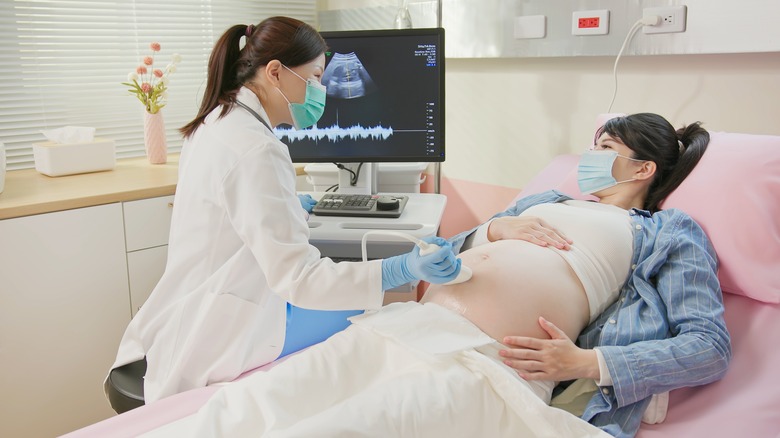Common Misconceptions About Miscarriages
A miscarriage is defined by Mayo Clinic as "the spontaneous loss of a pregnancy" that occurs before 20 weeks. Any loss of a pregnancy during or after the 20th week is classified as a stillbirth (via the Centers for Disease Control and Prevention). The majority of miscarriages are reported as taking place early on in the pregnancy — even as early as on or before 12 weeks. Common symptoms of a miscarriage include spotting or bleeding, abdomen or lower back pain, and the passing of vaginal fluid (via Mayo Clinic).
Miscarriage is a complex issue and is difficult to discuss for many reasons, including the shame and secrecy that clouds many people's feelings toward their bodies and fertility issues (via Verywell Family). Due to this, many people may begin their pregnancy journey unaware of the most basic facts regarding miscarriage. Curiosity will only increase once a person does manage to conceive or, unfortunately, encounters an experience with early pregnancy loss.
However, from old wives' tales to unsupported claims found on the internet, it's all too easy to encounter outdated and harmful misconceptions regarding miscarriage, including its causes, effects, and the best strategies to prevent such a loss.
Misconception: Miscarriages are uncommon
Despite many believing that miscarriages are rare, the U.S. Department of Health & Human Services Office reports that as much as 10-15% of confirmed pregnancies are lost before being carried to full term (via Office on Women's Health). The actual number is most likely a lot higher, as many miscarriages happen so early on in pregnancy that the carrier may never know they were pregnant in the first place.
The word "miscarriage" itself might mislead people into believing that a problem occurred in the "carrying" of the pregnancy. However, most miscarriages are the body's natural response to an unhealthy fetus (via Mayo Clinic). While early miscarriages are common, late miscarriages are also possible; however, they're more uncommon and occur in 1-2% of pregnancies. According to Tommy's, a miscarriage is officially labeled a "late" miscarriage if it happens after 12 weeks and before 24 weeks.
Regardless of the form of miscarriage, it's important to remind people that their experience is not rare and that there is a community out there who've had similar experiences and can provide support. Verywell Family has even published an article compiling different organizations, nonprofits, and support groups whose sole purpose is to combat the loneliness that often accompanies the grief of pregnancy loss.
Misconception: Stress is a central cause of miscarriage
While many people who have experienced a miscarriage often look back on their pregnancy combing for possible mistakes in their own behavior or biology that could have caused the miscarriage, the truth is the reason for the loss is almost always a chromosomal abnormality within the fetus (via the NHS). These "building blocks" are essential to the development of a baby. Therefore, when these foundational materials are found to be faulty, the growth of the baby may be stunted, often resulting in a miscarriage. Furthermore, too many or too few chromosomes may prevent healthy development (via the NHS). Stress level is one aspect that carriers are understandably concerned about, but the majority of all scientific studies have asserted no definitive link between stress and miscarriages (via Tommy's).
However, increased levels of stress could cause a rise in blood pressure or result in a lack of appetite, both of which have been shown to be factors in early pregnancy loss (via Healthline). If stress causes a carrier to skip meals, then the fetus may be deprived of many of the nutrients necessary for its early developmental stages. However, a carrier's stress level or general mental and emotional health bear no independent link to an increased chance of pregnancy loss (via the NHS).
Misconception: Exercise causes miscarriages
Rather than warning people to stay away from exercise during pregnancy, the American College of Obstetricians and Gynecologists (ACOG) recommends regular exercise for carriers, stating that it doesn't put people at risk of miscarriage. Though it's important to discuss and plan an exercise regimen with a healthcare specialist, a generally healthy person who is experiencing a low-risk pregnancy will almost always be given the go-ahead by their doctor.
Exceptions will occur if the carrier has a history of heart or lung conditions, cerclage, preeclampsia, severe anemia, or is expecting multiples (twins, triplets, etc.), as these are considered to place a pregnancy in the "unsafe to exercise" category. If a person has these conditions, exercise is to be avoided during pregnancy (via the ACOG). However, for the majority of expectant carriers, gentle exercise is found to be incredibly beneficial. Mayo Clinic goes so far as to recommend doing a minimum of 30 minutes of exercise on most days during the week.
Walking, swimming, cycling, and low-impact aerobics are considered the best forms of exercise for pregnant people, while strength training with light weights is also encouraged (via Mayo Clinic). Contact sports such as hockey, basketball, soccer, and volleyball are exceptions. It's important to refrain from these potentially violent sports during pregnancy, as their one-on-one nature poses great risks to both the carrier and the baby (via Mayo Clinic).
Misconception: Most miscarriages have a clear explanation
There are a number of tests a doctor may run to determine whether or not a miscarriage has occurred, including an ultrasound, blood tests, pelvic exams, and tissue tests. However, even after it's been confirmed that a miscarriage has occurred, doctors are rarely able to determine the exact cause of the loss (via Mayo Clinic). Generally, miscarriages are caused by chromosomal abnormalities. These issues can lead to miscarriage-causing conditions known as intrauterine fetal demise, molar or partial molar pregnancy, or a blighted ovum (via Mayo Clinic). These conditions halt fetal development, causing the carrier to miscarry. However, it's rare to be able to pinpoint one of these diagnoses as the direct cause of a miscarriage, especially when a pregnancy is lost early on (via Mayo Clinic).
The cause of miscarriage is often so mysterious and out of our control that in 2016, Tommy's National Centre for Miscarriage Research launched Britain's first research center committed to understanding the cause of miscarriages and how to prevent them. "We know that half of all early miscarriages, for example, are not due to chromosomal abnormalities, but have underlying causes that we can cure," the organization asserted (via Tommy's). The aim of their research is to uncover details about these underlying causes and to seek remedies. Examples of their research include projects titled, "Is there a link between vitamin D levels and miscarriage?" and "Is there a link between adenomyosis and miscarriage?"
Misconception: There is nothing that can be done to help prevent a miscarriage
While the majority of miscarriages happen due to reasons out of human control, there are certain behaviors that can put people at higher risk of having a miscarriage, such as smoking, drinking, and using illegal drugs (via Tommy's). Smoking, in particular, is so toxic that just being in the vicinity of cigarette smoke can cause a myriad of health concerns for the carrier and baby, including miscarriage (via the Centers for Disease Control and Prevention).
Additionally, a 2020 study found that weekly alcohol consumption during the first five to 10 weeks of pregnancy can lead to an 8% chance of miscarriage (via ScienceDaily). According to the investigator of the study, Katherine Hartmann, M.D., Ph.D., many carriers believed that drinking alcohol during pregnancy is "likely to be safe" if consumed at "modest levels." However, Hartmann found alarmingly contradictory evidence. "Levels of use that women, and some care providers, may believe are responsible are harmful, and no amount can be suggested as safe regarding pregnancy loss," Hartmann said (via ScienceDaily).
As for the use of drugs, such as cocaine or marijuana, Stanford Medicine reports that any drug-like substance consumed by the carrier will naturally travel through their bloodstream to the fetus via the placenta, often resulting in a host of birth defects, dangerously low birth weight, sudden infant death syndrome (SIDS), or miscarriage.
Misconception: People who've had an abortion are more likely to miscarry
There is a misconception that having had an abortion may increase the likelihood of having a miscarriage in the future. However, a carrier's past experience with abortion does not directly affect their ability to have a healthy pregnancy later in life (via the NHS).
Verywell Family corroborated this by citing a study that explored the connection between abortion and miscarriage. The study surveyed a total of 11,800 people who all suffered a miscarriage in their first trimester, concluding that "medically induced abortions did not cause an increase in the risk of future miscarriage or other pregnancy complications like ectopic pregnancy, preterm birth, or low birth weight."
A medical abortion is defined as an abortion that occurs during the early stages of pregnancy when a person elects to take medication given by their medical provider. On the other hand, a surgical abortion is an abortion that involves the use of suction or a tool called a curet to extract the fetus from the uterus vaginally (via Mayo Clinic). Some people who undergo surgical abortions may experience infection, blood loss, or uterine issues following the procedure. In this case, there may be a link between surgical abortion complications and subsequent fertility problems, including miscarriage (via Verywell Family). However, this does not directly link previous abortions with future miscarriages.
Misconception: Miscarriages are hereditary
Often, people who open up about their fertility issues find they're not the only person in their family who's suffered a pregnancy loss. While it can be comforting to discover that one is not alone in experiencing this loss, a discovery like this can sometimes lead people to believe they're genetically predisposed to miscarry. On the contrary, researchers agree there is a low possibility of one's likelihood to miscarry increasing if there is a family history of pregnancy loss.
There are certain cases where miscarriage can be a symptom of a genetic disease, such as antiphospholipid syndrome or an asymptomatic chromosomal disorder, but miscarriage itself is not recognized as a hereditary condition (via Verywell Family). In fact, instances of these conditions are so rare that scientists have found that only 5% of those who experience one or more miscarriages can trace their miscarriages back to one of these genetic disorders.
Generally, first-term miscarriages can be explained by a disruption in the chromosomes of the fetus, which causes the fetus to stop developing, leading to a miscarriage (via the NHS). While chromosomes are known as the foundations of DNA, an abnormal chromosome detected within a fetus usually has little to no correlation to the carrier's family history of miscarriage.
Misconception: Experiencing multiple miscarriages is a sign of infertility
Fertility journeys are often discouraging, especially if that journey includes an experience with miscarriage. While miscarriages are more common than many people think, it's still rare to experience what Yale Medicine refers to as recurrent miscarriages — two or more pregnancy losses. Only about 2% of people will have two consecutive miscarriages; however, for those who do, fears of an underlying fertility issue may take hold.
According to UChicago Medicine, pregnancy loss does not equal infertility. Infertility is broadly defined as a person's inability to conceive after one year of failed attempts, while a miscarriage is when a pregnancy is lost sometime after conception. Both experiences can be emotionally devastating, with the Miscarriage Association acknowledging that a pregnancy loss can feel "even worse than not conceiving, as the joy of becoming pregnant was followed by the distress of loss."
However, it's important to distinguish between the two, as knowing one's fertility status is crucial to future family planning and medical decisions going forward. Yale Medicine advises people to pursue a medical evaluation for a possible infertility diagnosis if they experience more than two recurrent miscarriages, as this may indicate fertility complications. However, this only affects about 0.5% of carriers.
Misconception: It's impossible to become pregnant immediately after a miscarriage
A very common misconception surrounding miscarriage is the belief that it will take several months, or even up to a year, to become pregnant again after a miscarriage. However, ovulation can take place as soon as two weeks after a miscarriage and lead to a healthy pregnancy (via Mayo Clinic). Though it's possible to conceive this early after a pregnancy loss, the guidance on what is most healthy for the carrier and the baby is mixed, with most specialists advising that the decision is ultimately up to the carrier to decide when they feel mentally and physically prepared to carry again.
The World Health Organization (WHO) recommends (via Verywell Family) waiting at least six months after a miscarriage to help "reduce the risks of adverse outcomes" such as suffering a second miscarriage. However, one report refuted WHO's findings, concluding that a pregnancy conceived within six months of a miscarriage is not linked with adverse pregnancy outcomes (via Verywell Family).
However, the American College of Obstetricians and Gynecologists (ACOG) holds the position that there is almost never any medical reason to postpone attempts to conceive again following a miscarriage. Their only suggestion is to wait to conceive until after one menstrual cycle in order to better track the pregnancy (via Verywell Family).
Misconception: Having one miscarriage makes a second miscarriage more likely
Does having one miscarriage make a second miscarriage more likely? What exactly causes a second miscarriage to occur? These are questions that might haunt someone who suffered a miscarriage before. According to Tommy's, recurrent miscarriages are uncommon and a repeat miscarriage is only experienced by 1% of those trying to conceive. Mayo Clinic is equally encouraging, stating that pregnancy loss is often something that occurs just once for people and that the majority end up having healthy pregnancies and carrying full term even after miscarrying in the past.
While it's impossible to predict the future, science tells us that there is only a 20% risk of miscarrying for a second time. After two recurrent lost pregnancies, the risk of a third goes up to 28% (via Mayo Clinic). Much of the reasoning behind miscarriages is mysterious and besides the obvious — frequent doctor's visits and staying away from drugs, alcohol, and cigarettes — there is no sure way to avoid having a second miscarriage (via Tommy's).
Regardless, the loss of a pregnancy is emotionally stirring, and it's normal to experience grief and anxiety when trying for a baby. Per Tommy's guidance, it's important to treat yourself with kindness and compassion and reach out to your medical team for advice and support.
Misconception: Miscarriage is a modern phenomenon
Just as people have been birthing and raising babies since the dawn of time, many of our ancestors also experienced the pain of miscarriage. Despite the misconception that modern medications or technologies have affected fertility, the truth of the matter is that, up until the 20th century, it was very common to lose at least one baby during pregnancy, including miscarriage and stillbirth.
Historian Shannon Withycombe explores this topic in her book "Lost: Miscarriage in Nineteenth-Century America." By combing through diaries, letters, and medical records from the 1800s, Withycombe was able to unearth a lineage of ancestors who have also known, and were able to cope, with the grief of pregnancy loss (via Slate). To Withycombe's surprise, for many in the past, a miscarriage was even a greeted cause for celebration. One woman's reaction to her miscarriage read: "I am happy again ... O Bliss, O Rapture unforeseen!" Withycombe argues that, though this reaction to miscarriage may seem unnerving to modern readers, it was a completely understandable response coming from an era when women's lives were basically "twenty or thirty years of constant pregnancy, birthing, and nursing" (via Slate).
By educating ourselves on this important aspect of history, we can begin to feel less alone in our own experiences with early pregnancy loss, while also challenging the ways our culture has taught us to view pregnancy and parenthood.
Misconception: Miscarriage is a personal issue and should be kept private
One of the most harmful misconceptions surrounding miscarriage is its ties to shame and that it should be kept secret. On the contrary, discussing miscarriage openly can be an effective way to heal from grief. According to the health resource center Bodily, it's entirely up to the person who experienced the pregnancy loss to decide if, when, and to whom they break the news of their miscarriage; however, it's advised to have a support system following a pregnancy loss as opposed to handling it alone.
One key tip offered by Verywell Family is to keep it simple. People should not feel pressure to disclose personal medical details, especially if the party they are hoping to inform is a boss, supervisor, or another professional contact. As for close personal friends and family, however, it's important to let people know what you need. Whether you're looking for a conversation partner to unpack your feelings with or just someone who can fulfill more practical duties, like driving you to a doctor's appointment, it's helpful to communicate exactly what kind of care is most needed during this time.
Overall, experts agree that it's important not to fester in whatever feelings your miscarriage might be bringing up, whether it's despair, grief, relief, or a complicated mixture of the three. As with any kind of loss, communication is key to healthily moving forward.












